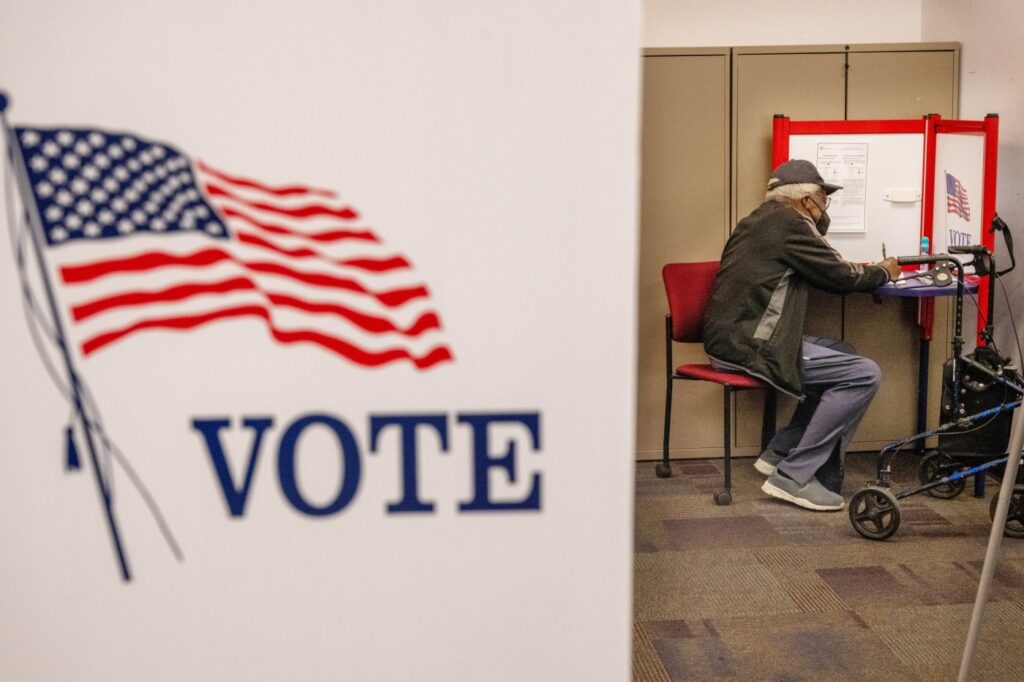
Remember the old saw about leading a horse to water but unable to make it drink?
The horse, it’s assumed, just wasn’t interested and that’s an apt description of the nearly 22 million Californians who have been given ballots for today’s primary election.
Through Monday, data guru Paul Mitchell reports that just 14% of those ballots had been returned to local election officials for counting, indicating that voter turnout could drop below the current record-low of 25.17% set in the 2014 primary.
It’s not difficult to understand why. Primary elections mostly determine which candidates will face each other five months hence. This year’s primary is especially lackluster and its weak dynamics cannot compete with other matters preoccupying voters, from COVID-19 to skyrocketing gasoline prices and surges in crime.
In fact, there’s just one high-profile political contest that will be resolved today — whether San Francisco District Attorney Chesa Boudin will be recalled for his policies that, critics say, are too lenient on lawbreakers.
Pre-election polls indicate that the recall could succeed and the election has attracted national media attention because of San Francisco’s reputation for leftish politics and the potential setback for the national criminal justice reform movement.
Aside from the Boudin recall, the most noteworthy contest is a three-way battle for Los Angeles mayor. Polls indicate that Congresswoman Karen Bass and businessman Rick Caruso are running neck-and-neck with Los Angeles City Councilman Kevin de León a distant third.
De León will probably end with single-digit support, but that likely will be enough to prevent either Bass or Caruso from gaining a majority and thus force a November runoff for the right to govern a city plagued by issues — homelessness, crime, traffic congestion, racial tension, economic torpor and political discord — that have bedeviled previous mayors.
That’s about it in terms of issues and contests that could motivate large numbers of voters to mail in their ballots. There are a few that interest political junkies, such as who will finish in the top two in some legislative and congressional districts. But the real games will be decided in November — whether California will play a role in the national duel for control of Congress, and the rivalry between progressives and moderates for control of the state Assembly.
Another factor that undercuts voter motivation in this primary is the lack of high-profile ballot measures.
For decades, California’s constitution declared that statewide initiative measures could appear only on a “general election” ballot, presumably the November election. In 1971, however, a young secretary of state named Jerry Brown decreed that measures could be placed on the primary ballot as well.
Three years later, Brown used his own ruling to place Proposition 9, a political reform measure, on the 1974 primary ballot — a major factor in his successful campaign for governor that year.
For the next four decades, primary election ballots included some of the state’s most far-reaching, hard-fought ballot measures that drew voters to the polls, including Proposition 13, the iconic tax limitation measure in 1978.
Related Articles
The Summit of the Americas will save and improve lives
Unjust sentencing law is overdue for reform
Water restrictions show folly of California’s rejection of large-scale desalination projects
Democratic factions vie for power in Assembly
Stop imposing mandates for women’s ‘own good’
In 2011, however, Brown, once again governor, countermanded his own 1971 decree by signing legislation to once again confine initiative measures to the November general election ballot.
Why? Democrats wanted to prevent a so-called “paycheck protection” measure, limiting unions’ ability to extract campaign funds from their members, from appearing on the 2012 primary ballot. Forcing it onto the November ballot, they believed, would make passage less likely.
The ploy worked as voters rejected the measure. But ever since, primary election ballots have lacked voter-motivating ballot measures and turnout has been weak.
CalMatters is a public interest journalism venture committed to explaining how California’s state Capitol works and why it matters. For more stories by Dan Walters, go to calmatters.org/commentary.
